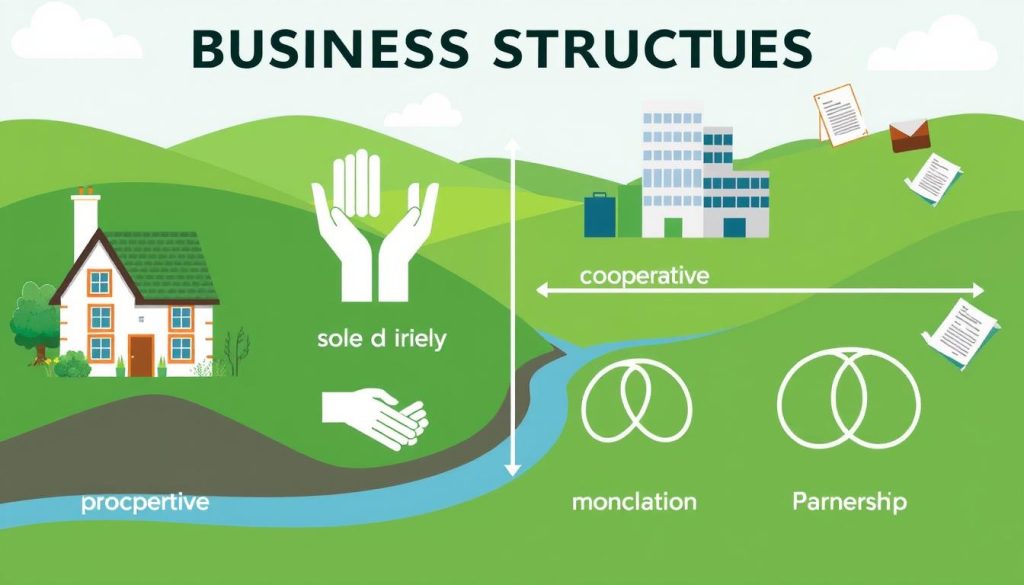Starting a business in Ireland is full of opportunities. But, it’s important to know the legal rules first. Entrepreneurs need to follow these rules to succeed in the long run.
The Central Statistics Office of Ireland says it’s key to understand these legal frameworks. The Irish Government’s website has great resources to help. It makes starting a business easier for new owners.
Understanding the Business Landscape in Ireland

In recent years, Ireland has become a hotspot for entrepreneurs and startups. The economic scene is full of both chances and hurdles. It’s vital for new businesses to understand these complexities well.
A report by Enterprise Ireland points out key areas like IT, pharmaceuticals, and finance. These sectors show Ireland’s economic strength.
The Irish government has set up policies to boost innovation and draw in investors. These efforts help create a supportive space for startups. They encourage businesses to look into different market chances.
Foreign investment is also key in Ireland’s economy. Many big companies have set up shop here.
It’s important for entrepreneurs to get the hang of Ireland’s business scene. Staying updated with trends and changes helps businesses make the most of Ireland’s growth chances.
Benefits of Starting a Business in Ireland

Starting a business in Ireland has many advantages. The country has a low corporate tax rate, one of the lowest in Europe. This makes it easier for businesses to grow and make profits.
Being part of the EU market is another big plus. It gives businesses a wide range of customers and makes trading easier. Ireland’s skilled workforce also helps businesses innovate and develop.
Government incentives are important too. There are grants and funding for startups. This shows Ireland’s support for new businesses.
Ireland also has clear rules for businesses. This lets companies operate with confidence. All these points make Ireland a great place to start a business, offering growth and a stable environment.
Types of Business Structures in Ireland

Choosing the right business structure is key for any entrepreneur in Ireland. There are many types, each with its own benefits and challenges. These include liability, taxes, and rules to follow.
A sole trader is the simplest form. It gives the owner full control over the business. But, the owner’s personal assets could be at risk if the business owes money.
Partnerships let two or more people work together, sharing profits and losses. It’s good for teamwork and sharing resources. But, like sole traders, partners also face unlimited liability unless they set up a limited liability partnership.
A limited company offers big benefits, like limited liability. This means the company’s debts don’t affect the owner’s personal assets. But, limited companies must follow strict rules and pay taxes, making them more complex.
The Companies Registration Office helps with choosing the right structure. They offer detailed guides to help entrepreneurs make the best choice. By understanding each option, business owners can pick the one that fits their goals and risk level.
Legal Requirements for Starting a Business in Ireland

Starting a business in Ireland means you need to know the law well. Choosing the right legal structure is key. It affects how you’re taxed and how much you can lose if things go wrong. You can pick from many legal setups, each with its own rules and how your business works.
Getting advice from experts can help you make the best choice. This choice should match your business goals.
Choosing the Right Legal Structure
The first thing to do is pick a legal structure for your business. You can choose from being a sole trader, a partner, or a company. Each option has its own rules about who’s responsible for debts and taxes.
For example, if you’re a sole trader, you’re personally responsible for business debts. But, if you’re a limited company, your personal money is safer. Knowing this is important for keeping your business running well.
Registration and Compliance Obligations
After choosing your legal structure, you need to register your business. If you’re a certain type of business, you must register with the Companies Registration Office. This includes getting a business name and registering for taxes with the Revenue Commissioners.
It’s also important to keep up with ongoing rules. You need to file annual returns and pay taxes on time. Following these rules helps you avoid fines and keeps your business running smoothly.
Naming Your Business: Legal Considerations

Choosing the right business name is key to success. A good name reflects your brand and has legal importance. It’s important to pick a name that appeals to your target audience.
Before you decide on a name, check for existing trademarks. This step avoids legal issues and ensures your name is unique. The Intellectual Property Office offers help with trademark registration.
It’s also crucial to check if a domain name is available. A matching domain name boosts your brand and makes it easier for customers to find you online. Without checking, you might have to change your name or website later.
Lastly, talk to the Companies Registration Office about naming rules. Knowing these rules helps you avoid legal problems and ensures your name is correct.
Taxation Obligations for Businesses in Ireland

In Ireland, businesses face specific tax rules, especially for VAT and corporation tax. It’s crucial to grasp these to follow tax laws well.
Value Added Tax (VAT) is charged on goods and services sold, with a 23% standard rate. Some items get lower rates or are VAT-free. This means businesses need to know which ones apply to them. If a company’s sales hit a certain level, it must register for VAT.
Corporation tax is 12.5% for trading income, making Ireland a good spot for businesses. Companies must check if they qualify for this rate and keep detailed records. Not following corporation tax rules can result in big fines.
Talking to tax experts can help a lot. They offer advice that suits a business’s specific needs. Their knowledge is key for dealing with tax issues, making sure everything is filed correctly and staying compliant.
Licensing and Permits Needed

Starting a business in Ireland means following certain licensing and permits rules. Each industry, like food, health, and construction, has its own set of rules. Knowing these rules is key to following the law and running your business well.
To get the right licenses, first figure out what you need based on your business. For example, a restaurant needs a food service license. A construction company might need permits for safety and the environment.
- Food and Beverage: Licences such as Publican’s Licences or Food Business Registration.
- Health Services: Compliance with health regulations and relevant health service permits.
- Construction: Planning permissions and safety certifications.
Using the Government of Ireland’s resources can help a lot. Their business regulations page has all the info you need. It tells you which licensing and permits you need for your business.
Intellectual Property Considerations

For startups in Ireland, knowing about intellectual property (IP) is key. It helps protect creative and innovative assets. IP includes copyrights, trademarks, and patents, each guarding different parts of a business.
Copyrights cover original works like literature, music, and art. Once created and fixed, they get automatic protection. Businesses must watch out for copyright issues to protect their rights.
Trademarks safeguard brand names, logos, and slogans. Registering them with the Irish Trademark Office proves ownership. It also boosts brand recognition and prevents legal fights.
Patents are vital for inventions and new technologies. Startups with new products or processes should apply for patents. This shows they value innovation and can stand out in the market.
Businesses can use resources from authorities and experts to handle IP. Working with legal advisors helps build a strong protection plan. Startups should manage their IP well, keeping records up to date and watching for infringement.
Employment Law and Employee Rights

Employment law is key in setting rules for how employers and employees work together in Ireland. Knowing what rights employees have is crucial for following the law and creating a good work place. This part talks about the important parts of employment law, like the need for clear contracts and agreements.
Contracts and Agreements
Contracts and agreements are the foundation of the employer-employee relationship. They make sure everyone knows their job, what they have to do, and what they get. It’s important these documents follow the latest employment law to protect both sides. Here are some important things to remember:
- Written Contract: Giving a written contract is not just good practice; it’s often needed by law. It should cover job duties, pay, and working hours.
- Employee Rights: Contracts must show employee rights, like leave, sick pay, and how to end a job.
- Agreements on Confidentiality and Non-Compete: These agreements keep business secrets safe and ensure fair play after someone leaves.
- Compliance with Policies: Putting company policies in contracts makes sure employees know their rights and duties about work behaviour and how to complain.
Health and Safety Regulations

Health and safety rules are key to keeping workplaces safe. The Safety, Health and Welfare at Work Act makes it clear that employers must focus on safety. They must do thorough risk assessments to find and fix hazards.
The Health and Safety Authority of Ireland helps businesses a lot. It offers advice and training to help follow health and safety rules. This is important for keeping everyone safe at work.
- Employers must ensure that the workplace is free from hazards.
- Regular training on health and safety practices is vital for all employees.
- Documentation of risk assessments is required for compliance purposes.
Funding Options for New Businesses

Starting a business in Ireland offers many funding options. These help entrepreneurs grow their ventures. Government grants are a key source, helping new businesses start without immediate repayment.
Angel investor networks also play a big role. They give capital and advice to startups. Venture capital firms invest in businesses with high growth potential, often taking a share in return.
Organisations like Enterprise Ireland and Local Enterprise Offices are crucial. They offer financial help and advice on investments. It’s important for entrepreneurs to explore all funding options to build a strong financial base.
- Explore government grants for initial funding.
- Engage with angel investors for mentorship and capital.
- Consider venture capital for significant investment opportunities.
- Utilise resources from Enterprise Ireland for additional support.
- Research local funding options provided by Local Enterprise Offices.
Diversifying funding sources helps new businesses stay financially stable. It prepares them for growth in the competitive Irish market.
Setting Up Business Bank Accounts

Getting a business bank account is key for managing your finances well. Banks like Bank of Ireland and Allied Irish Banks (AIB) have services made for businesses. They offer accounts that help you handle money and expenses easily.
Keeping your personal and business money separate has many benefits. It makes your finances clearer, makes tax easier, and helps track business costs. Also, having a business account lets you use online banking, making transactions smoother.
- Choose a bank that fits your business needs.
- Look at features like online banking, overdrafts, and limits on transactions.
- Get ready with your ID and business details.
- Apply and get your account ready to use.
Looking at different banks can help you find one with good deals for business accounts. Good financial management helps your business grow and stay strong.
Adhering to Data Protection Laws

Data protection is key for businesses in the European Union, especially with the General Data Protection Regulation (GDPR). This law sets strict rules for handling personal data. Companies must follow these rules to protect their operations and their customers’ privacy.
The Irish Data Protection Commission offers helpful guidelines. These guidelines help businesses understand and follow data protection laws. Important points include:
- Getting clear consent from people before using their personal data.
- Only collecting data that’s needed for the purpose it’s used for.
- Using strong security to keep data safe from hackers.
- Letting people see their data and ask for it to be deleted.
Not following these rules can result in big fines. This shows how crucial data protection is in business planning. Staying true to these laws builds trust with customers, which is essential for success.
Resources and Support for Startups in Ireland
In Ireland, the business world is buzzing with activity. Many resources are here to help startups grow. Government groups like Enterprise Ireland offer funding, market advice, and networking chances. This support is key for innovation and helping startups grow.
Local groups, like Chambers of Commerce and regional agencies, add to the help available. They help with paperwork and bring startups together. This way, entrepreneurs can build a strong base for their businesses.
Incubators and accelerators, like Dogpatch Labs and NDRC, are also crucial. They give specific advice and funding chances. Startups should dive into these places for mentorship, networking, and more. Being part of these programs can really boost growth and set startups up for success.







